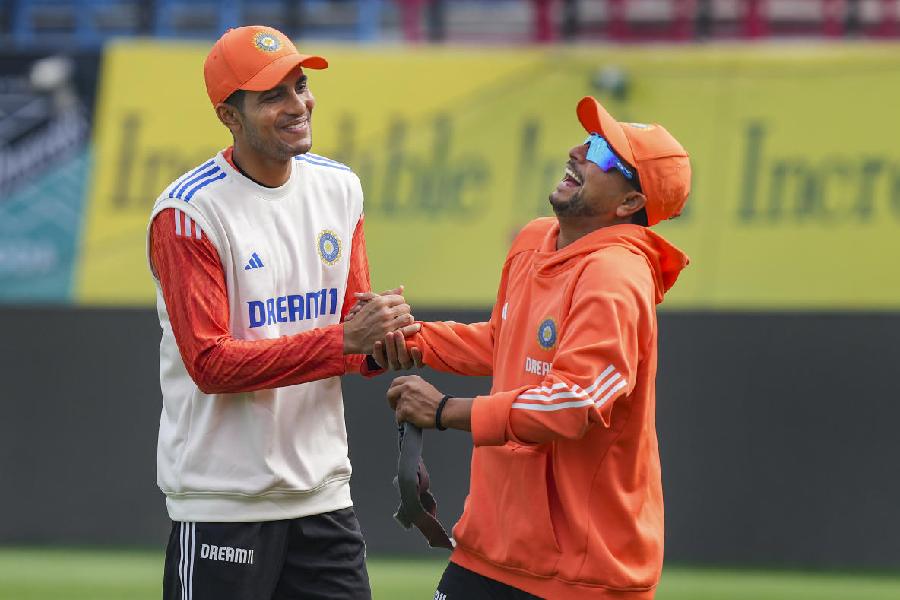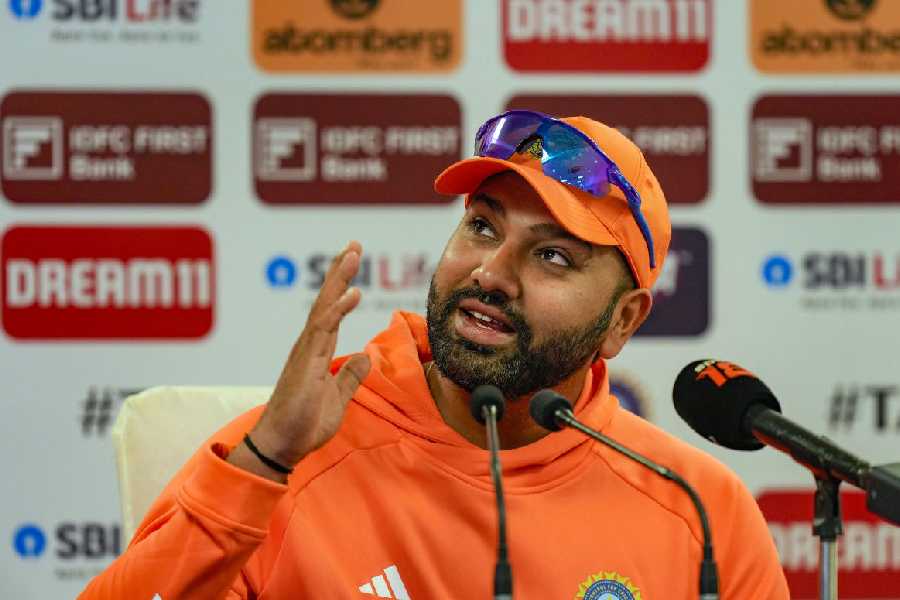Rohit Sharma carries the calm and composure of the Buddhist monks in these parts though his hilarious one-liners often leave his teammates in splits.
“Kuch seconds baaki hain, sab log dimaag lagao (Only a few seconds left, put your heads together),” the captain told his players when they were hesitant in going for a DRS call for leg-before against Ben Stokes in Ranchi. Or when he yelled at the rookie Sarfaraz Khan, who was fielding at short leg, to put on his helmet: “Hero nahi banne ka (Don’t try to be a hero).”
But make no mistake. Beneath the humour and mischievous smile lies a thinking mind which has largely contributed to his achievements as a captain.
Days after the T20I series against Afghanistan, the think-tank got together in Hyderabad to analyse the Englishmen’s strengths and weaknesses. It involved hours of discussions and strategising and planning to perfection.
Contingencies were taken into consideration: If Plan A doesn’t work, formulate a Plan B or work on evolving a Plan C. If none is operational, trust the instincts and go with on-field intuitions — this was the message that was delivered at team meetings.
Even the non-availability of players or injuries doesn’t upset Rohit. Mohammed Shami was never in contention but the sudden pull-out of Virat Kohli also couldn’t demotivate or shake him off his resolve. He stayed prepared for the worst while being uncompromising in his objective.
“Rohit is never shaken by adversities. He trusts his teammates and can motivate them to the hilt. He has found a trusted ally in Dravid who can spend hours talking to a cricketer, explaining the nuances of the game. At times his sessions go well past midnight,” someone who has been part of the core team said.

Dharamshala India's Shubman Gill and Kuldeep Yadav during a practice session ahead of the fifth Test cricket match between India and England, in Dharamshala, Wednesday, March 6 PTI
KL Rahul and Ravindra Jadeja’s injuries after losing the first Test in Hyderabad never came as a rude jolt. The success of youngsters like Sarfaraz, Dhruv Jurel and Akash Deep didn’t happen out of the blue but as a result of the faith reposed in their talent.
“I don’t think that players are injured or players are not available. Since I became captain, I haven’t played with a full team. It’s no excuse, but it is what it is, so you can’t change that thing. Work with what you have and keep a good atmosphere, play with freedom,” Rohit said about his mantra for success.
“These players are picked because they have the game. They have the talent, can hold the bat, play a cover drive or a flick. And can bowl well. Once coming here, a little bit of nurturing is necessary because you need to know what weapon to use, in what situation.”
The way India have repeatedly wriggled out of tough situations in South Africa and in this series has been inspirational. It could form a blueprint for achieving success in crucial overseas assignments in the World Test Championship cycle.
The team was struggling at 33/3 on the first morning in Rajkot and it could have been worse had Joe Root held on to Rohit’s chance at slip. Rohit and Jadeja went on to forge a match-winning partnership.
England lost another opportunity when they were comfortably placed at 207/2 at close on the second day. The infamous Root reverse scoop the next morning triggered a collapse.
The way the late-order responded in the series-clinching fourth Test in Ranchi was more dramatic. At 177/7, India looked down and out, but Jurel and Kuldeep Yadav batted England out of the match.
These are only a few of the moments that triggered Bazball’s failure. It has also left the “biggest whining and moaning media in sport”, as Sunil Gavaskar put it, very little to complain about on what has been sporting wickets.
“I haven’t studied much in school, I am studying here a lot. It is important that every team tries to play differently and to understand that is important. I enjoy that as I get to learn about my game and about captaincy,” Rohit said in his inimitable style.
“Whenever I come into a series as captain, my work is to understand the opposition and our team... I have a big role because firstly I am a batter and have to score runs; then I have to settle the batting order... what is the strength of my bowlers and how we can bowl the opposition out. Where they play their shots and how to block them and exploit their weaknesses. It is the basics of cricket,” the captain explained.
Rohit’s handling of young talent has been part of cricketing folklore throughout his Mumbai Indians days. And he remains relaxed (“bindaas” in his own words) about failures. That allows players the freedom.
“If you are going out in a certain situation, you are prone to make mistakes. You might play a bad shot in a pressure situation and get out; it might look bad... But you have to learn and ensure not to repeat the same mistake in a similar situation again,” he said.
But have India managed to crack the Bazball code which fetched Ben Stokes’ men
13 victories in their last 18 Tests? Rohit had a cryptic reply.
“I honestly don’t know what Bazball means... whether it is to go and strike, whether it’s to defend or wait for a loose ball. I haven’t seen wild swings from anyone,” he quipped.











